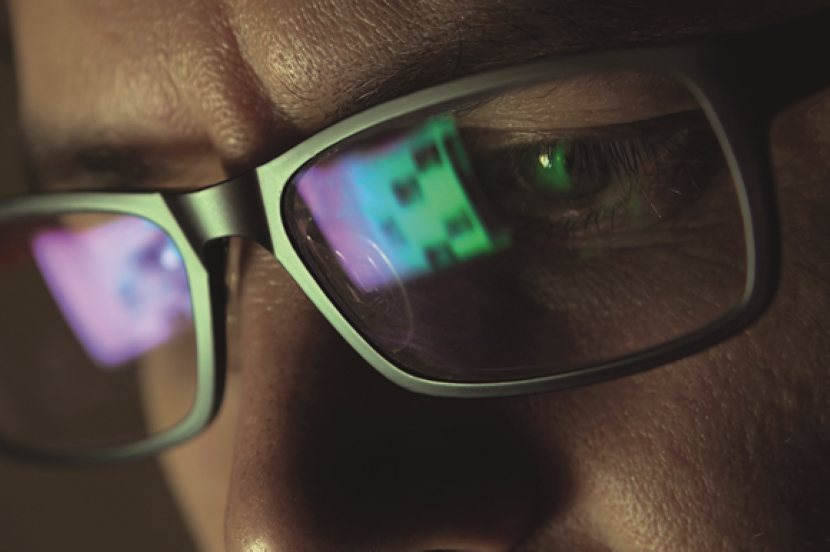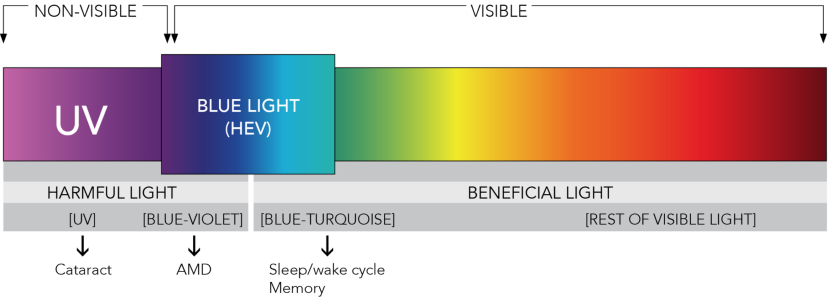Blue light blocking glasses: Do they actually work?
 Shutterstock
Shutterstock
While browsing through your social media, you see a sponsored ad for “Blue Light Blocking Glasses” that claims to “protect your eyes from the harmful light coming from your computer / mobile screen”. Wondering what this blue light really is and why do you need to keep yourself protected from it? Keep on reading.
Contents
What is blue light anyway?
Light is not what we see; there is only a certain wavelength range that the human eye can perceive. Out of this range are the Gamma rays, X-rays, UV rays, Infra Red rays and multiple other types of radiations – not visible to the human eye. Blue light falls under the visible light spectrum and includes wavelengths ranging from 380nm to 500nm. It exists everywhere and is released naturally from the sun and the moon. However, LED, florescent lights and technological gadgets like mobile phones and computer screens etc. all release blue light in significant amounts, when measured alongside our usage of these devices.

The connection between blue light and human body
Since we know blue light can be seen from the naked eye, it is well apparent that the human eye cannot block it. All the blue light reaching our eyes enter them and reaches the retina, the third eye layer. This is so because the amount of natural blue light, excluding the artificial rays, we get is essential for a healthy brain and body. It is blue light that regulates our circadian or biological cycle, helping our bodies to fine tune the tasks that follow a daily routine, such as sleeping patterns. It also helps to boost mood, attention, reaction times, alertness and also to develop better memory and cognitive functioning. Certain psychological therapies also use blue light.
While the blue light is beneficial during the day time which essentially comes from the sun, its exposure during the night time through our screens which is more brighter, shorter-wavelength (more bluish) light, can have detrimental effects as it can disrupt our natural sleep patterns. Cathy Goldstein, an assistant professor of neurology at the University of Michigan Sleep Disorders Centre says, ‘‘Our bodies associate blue light with daytime, so being exposed to it when you’re trying to go to bed pushes our internal clock later so that it’s harder to fall asleep and harder to wake up in the morning’’.
Harmful effects of blue light
On average, 80 % of American adults are spending two or more hours on a digital device a day with 67% using two or more devices at the same time, according to The Vision Council. A survey conducted not-so-long-ago by contact lens provider Acuvue found that the average office worker spends approximately 1,700 hours a year or 6.5 hours a day in front of a screen.
This prolonged exposure to blue light, however, can be very harmful in this modern era, as we’re constantly surrounded by immense levels of light pollution. Excessive exposure may lead to dry eyes, cataract, hormonal imbalances (e.g. of melatonin and cortisol), AMD (Age-related Macular Degeneration) and/or changes in brain functions. It is also a very common reason behind eye-strains, that most of us experience after extended exposures to digital screens. Stronger, long-term effects aren’t well known. Harmful effects of the short-wavelength of blue light (450nm to 455nm) outweigh those of the longer wavelength of the blue light rays, as these wavelengths scatter more easily.
Researchers agree that blue light from LED devices like the televisions, smartphones, tablets or laptops reduces the body’s production of sleep-inducing melatonin which affects the quality of sleep at night.
According to American Optometric Association, digital eye strain is “a group of eye and vision related problems that result from prolonged computer, tablet, e-reader and cell phone use.” Those issues range from blurry vision and dry eyes, to headaches and neck pain.
However, a research compiled by the AOA (American Optometric Association) indicates that exposure to blue light for extended duration such as using your smartphone or computer all day might cause damage to your retina which is the innermost layer of your eye that is responsible for sending signals to your brain to process what you are seeing.
What are Blue Light Glasses?
Blue light blocking glasses may look like ordinary prescription glasses at first but they use special lens filters having the ability to block or absorb the transmission of blue light and in some cases UV light. This means, less exposure to blue light wavelengths while you are working on your computer or other mobile devices which helps to reduce digital eye strain.
Use of blue light blocking glasses is on the rise
According to Vision Council, which is the representative body of eyewear manufacturers and suppliers in the United States, about 60 percent of the Americans experience digital eyestrain in some form due to excessive usage of digital screens and as a cure, people are turning towards blue light blocking glasses and screens which has lead towards the emergence of blue light filtering eyewear industry in the last few years.
The number of people going after the blue light blocking special eyewear is gradually on the rise. The global market value for blue light glasses will increase from $18 million in 2019 to $27 million by 2024, as suggested by a market research company, Market Study Report. The benefits of blue light blocking glasses that are advertised and marketed by the different companies include improved sleep patterns, reduced eyestrain and headaches to name a few.
Contrasting opinions on the effectiveness of blue light blocking glasses
The important question here to ask is, do blue light blocking glasses actually work? Well, the answer is not a straightforward yes or no. It depends on whom you are asking.
Since the blue light glasses are not marketed as medical devices therefore the FDA doesn’t regulate the eyewear. And because of this, there’s not a lot of research available to support or oppose the effectiveness of blue light glasses.
Blue light blocking glasses filter out the blue light from the total light entering the eyes, but since its harmful effects are still under study, Optometrists’ recommendations on the blue light blocking glasses vary greatly.
- The American Academy of Ophthalmology says that the people don’t need to buy blue light glasses and has explicitly stated that they do not recommend any form of special eyewear for computer usage. The organization clearly says that blue light from digital devices does not lead to any kind of eye disease and doesn’t even cause eyestrain. Moreover, most of the problems that people complain about are simply due to overuse of digital devices.
- ”The symptoms of digital eye strain are linked to how we use our digital devices, not the blue light coming out of them,” says AAO. AAO further says, ”You don’t need to spend extra money on blue light glasses to improve sleep, simply decrease evening screen time and set devices to night mode”.
- The Association of Optometrists in the UK says that there is “a lack of high quality evidence to support using BB [Blue Blocking] spectacle lenses for the general population to improve visual performance or sleep quality, alleviate eye fatigue or conserve macular health.”
But some eye professionals believe that blue light glasses do have benefits.
- Greg Rogers, senior optician at Eyeworks of Decatur, Georgia, USA says, he has seen the benefits of blue light glasses among his shop’s customers. The staff would recommend some sort of blue light reduction technique either in the form of glasses, lenses or screen protectors if the customer’s daily screen time is 6 hours or more.
- Samuel Pierce, OD, former president of the American Optometric Association, while speaking to USA Today said that he recommended using blue light glasses to lessen eyestrain.
- The Vision Council, says “specialized glasses” are “one tactic” that might reduce eyestrain.
- Susan Primo, OD, an optometrist and professor of ophthalmology at Emory University, agrees that the research so far shows that most of the eye problems occur due to excess usage of digital screens rather than blue light itself. But she added that some patients who wear blue light glasses do report less eyestrain. “If you want to wear them and find some benefits, that’s fine,” she says.
Another argument in favor of blue light glasses is that they help you sleep better at night.
- A study conducted by the University of Houston in 2017 found that participants wearing the glasses showed about a 58% increase in their night time melatonin levels which helped them sleep better.
- Lisa Ostrin, a PhD professor at University of Houston’s College of Optometry said, “By using blue light blocking glasses we … can improve sleep and still continue to use our devices. That’s nice, because we can still be productive at night,” according to university’s news release.
Alternative to blue light glasses to reduce digital eyestrain and improve sleep patterns
Don’t want to put on special eyewear but still want to save yourself from the hazards of blue light-emitting screens? Well, the easier or not-so-easier solution would be; give your eyes a break.
The best method to protect yourself from the potential harms would be to limit your exposure to the blue light rays by limiting screen time.
All the vision related organizations including the American Academy of Ophthalmology and the Vision Council urge balance in screen usage.
They also recommend adopting the 20/20/20 rule which means: ‘’Every 20 minutes look at an object at least 20 feet away for 20 seconds. This allows the eyes to get back to normal.’’
The following steps recommended American Academy of Ophthalmology and Harvard University will help to improve visual performance, alleviate eye fatigue and overall well being:
- Adjust the position of your seat or computer, so that your eyes are about 25 inches away from the screen. Position the screen so you’re looking slightly downward.
- If you work a night shift or use a lot of electronic devices at night, consider installing an app that filters the blue/green wavelength at night.
- Use a matte screen filter on the screen. It will help to reduce glare.
- Avoid looking at bright screens at least two to three hours before going to bed.
- Use artificial tear drops when your eyes feel dry as prescribed by a medical practitioner.
- Expose yourself to lots of bright light during the day, which will boost your your mood and alertness during day and help you sleep better at night.
- If you wear contact lenses frequently, try wearing glasses now and then to give your eyes a break.